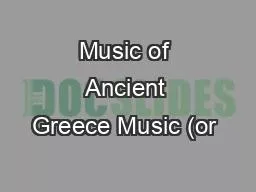PPT-Chapter 4 The Ancient Greeks
Author : stefany-barnette | Published Date : 2019-01-31
Lesson 1 Poets and Heroes Lesson 2 The Greek CityStates Lesson 3 Classical Greece 500BCE338BCE Lesson 4 Classical Greek Culture Lesson 5 Alexander and the Hellenistic
Presentation Embed Code
Download Presentation
Download Presentation The PPT/PDF document "Chapter 4 The Ancient Greeks" is the property of its rightful owner. Permission is granted to download and print the materials on this website for personal, non-commercial use only, and to display it on your personal computer provided you do not modify the materials and that you retain all copyright notices contained in the materials. By downloading content from our website, you accept the terms of this agreement.
Chapter 4 The Ancient Greeks: Transcript
Download Rules Of Document
"Chapter 4 The Ancient Greeks"The content belongs to its owner. You may download and print it for personal use, without modification, and keep all copyright notices. By downloading, you agree to these terms.
Related Documents














